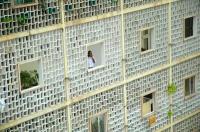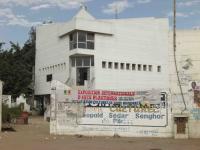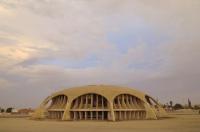 November 1975, quick as lightening thousands of persons flee the city. The colony is over, the counting begins from zero. Luanda is now an empty space and waits, anxious, for its new tenants. New habitants, new freedom. Like “squatters” now inside buildings marked by old moments, memories, scents from another time, Luanda anticipates and receives the new occupants with open doors.
November 1975, quick as lightening thousands of persons flee the city. The colony is over, the counting begins from zero. Luanda is now an empty space and waits, anxious, for its new tenants. New habitants, new freedom. Like “squatters” now inside buildings marked by old moments, memories, scents from another time, Luanda anticipates and receives the new occupants with open doors.
City
13.05.2010 | by Kiluanji Kia Henda
 It's not up to the neo-animists to invent anything or to feel forced to do so. On the contrary it is to insist on the evocation of all knowledges and on the review of all data, documents and materials available. They might reveal other answers, having both time and situation changed, that go beyond those found by former researchers or even by those who collected them or put them in order.
It's not up to the neo-animists to invent anything or to feel forced to do so. On the contrary it is to insist on the evocation of all knowledges and on the review of all data, documents and materials available. They might reveal other answers, having both time and situation changed, that go beyond those found by former researchers or even by those who collected them or put them in order.
Ruy Duarte de Carvalho
16.04.2010 | by Ruy Duarte de Carvalho
 The work presented by Yonamine in this exhibition speaks about the idea of erasure.
Yonamine comes from an erased country, Angola. A country which history, instead of working as a palimpsest – that is, a text over which multiple writings were produced leaving notice of those preceding them – has always worked as an erasing process. History has been erased in the name of a bigger interest. The Portuguese colonial past that Yonamine evokes with a subtle irony in the exhibition's title and in the tobacco boxes series was removed by the sudden decolonization process, which, by its turn, was erased by the war that now is being erased by peace.
The work presented by Yonamine in this exhibition speaks about the idea of erasure.
Yonamine comes from an erased country, Angola. A country which history, instead of working as a palimpsest – that is, a text over which multiple writings were produced leaving notice of those preceding them – has always worked as an erasing process. History has been erased in the name of a bigger interest. The Portuguese colonial past that Yonamine evokes with a subtle irony in the exhibition's title and in the tobacco boxes series was removed by the sudden decolonization process, which, by its turn, was erased by the war that now is being erased by peace.
Face to face
14.04.2010 | by Paulo Cunha e Silva
 I began to feel the painful lack of African history in my curriculum and the absence of Afro-Brazilians amongst my college peers. The way blacks were represented (or absent from) the media had bothered me since I was a child. Now, as a film producer, it made me even more uncomfortable. To escape this dilemma, I felt I had to follow my dream of making my own films, but where to begin?
I began to feel the painful lack of African history in my curriculum and the absence of Afro-Brazilians amongst my college peers. The way blacks were represented (or absent from) the media had bothered me since I was a child. Now, as a film producer, it made me even more uncomfortable. To escape this dilemma, I felt I had to follow my dream of making my own films, but where to begin?
Afroscreen
14.04.2010 | by Lilian Solá Santiago
 Dakar became overpopulated towards the beginning of the fifties. A displacement of families away from the inner city neighbourhoods was decided by the colonial state: they were truly "evictions" framed within urban planning projects. The Pikine department was created, regrouping "all of Dakar's excluded". Today it accounts for about one million persons: there is talk about "Pikine-Peking".
Dakar became overpopulated towards the beginning of the fifties. A displacement of families away from the inner city neighbourhoods was decided by the colonial state: they were truly "evictions" framed within urban planning projects. The Pikine department was created, regrouping "all of Dakar's excluded". Today it accounts for about one million persons: there is talk about "Pikine-Peking".
Afroscreen
14.04.2010 | by Rosa Spaliviero
Lily goes to church and prays a lot, but she is always wondering when this “f…” Jesus will come and finally knock on her door, toc, toc, toc…
Mukanda
12.04.2010 | by Barthélémy Toguo
 To western architects such as me, who have been developing their work as project designers or researchers in Angola, the issue that strikes us the most is the apparent conflict opposing Luanda to the rest of the Angolan territory.
To western architects such as me, who have been developing their work as project designers or researchers in Angola, the issue that strikes us the most is the apparent conflict opposing Luanda to the rest of the Angolan territory.
Ruy Duarte de Carvalho
12.04.2010 | by Cristina Salvador
 Kiluanji Kia Henda has displayed his art internationally – from Guangzhou to Cape Town, from Nairobi to Venice – which decouples his work from the exclusive legitimacy granted by Western contemporary art capitals. Another unique trait of his trajectory is that so far, his work has not been presented and sanctioned by the “small” world of its former “metropole”, Lisbon. As an Angolan artist, and therefore, from an independent country today and once a Portuguese colony, his art world’s has been extraneous to a set of cultural policies that take Portuguese-as-connection, and which rely on a closed circuit showcasing of art and its artists, traveling between ex-colonies and the ex-metropole.
Kiluanji Kia Henda has displayed his art internationally – from Guangzhou to Cape Town, from Nairobi to Venice – which decouples his work from the exclusive legitimacy granted by Western contemporary art capitals. Another unique trait of his trajectory is that so far, his work has not been presented and sanctioned by the “small” world of its former “metropole”, Lisbon. As an Angolan artist, and therefore, from an independent country today and once a Portuguese colony, his art world’s has been extraneous to a set of cultural policies that take Portuguese-as-connection, and which rely on a closed circuit showcasing of art and its artists, traveling between ex-colonies and the ex-metropole.
Face to face
12.04.2010 | by Marta Mestre